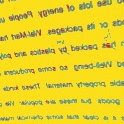facebook
I have promised students and friends to look into making a CESL-SIUC group on Facebook, and inviting everyone to join it. This would probably be quite simple and harmless. But I hesitate; I'm not sure why.
One reason is that people I know are basically using Facebook as an entire medium of communication, much like e-mail, or cell phones, or any of the other new media. As a media, it has its own unique features, and people are always inviting me to use new ones; many of them I don't understand, or can't control. I don't know how to take things off of my wall, for example, or just tell someone I'm interested in an application, but don't have time to figure out what it is or does.
I
will get to it though. This blog is becoming basically a written record of good ideas that aren't quite coming to fruition, because of lack of time, distractability, pressing family issues, stack of papers or whatever. My intentions are good. If someone were to take the ball and run with it, I would not only get out of the way, but also block, so to speak. Maybe it's not so complicated- like videocams on cellphones. You get used to seeing the other person, and then you can't imagine that you ever communicated without bumping up against their image every couple of minutes. Or without seeing them as they spoke. And someday, all the features of each- e-mail, chat, cell-phone, videocam, facebook, twitter, myspace, second life, blogs- will all be combined in an optimal medium that people can use as they see fit, can use to their own fullest advantage.
So, I sit on the cliff- in awe of the river, knowing it's just a river, yet, hesitant to get wet. Maybe it was growing up near Niagara Falls that draws this kind of analogy out of me.
Labels: cesl, chat, facebook, internet, second life, weblogs, writing
accidental data
I have an interesting problem that bloggers and blogging teachers might enjoy hearing about. I'm
very interested in how people acquire languages, especially people who are trying to do it, purposely and deliberately, over a period of time. Now I know that there are formal ways of studying this, but I get a lot more information just watching the steady flow of people in front of my eyes, over a period of, say, a year of six terms, sometimes 50-70 students per term, massive amounts of English.
Now, when I get them to publish stuff, it's always for a pedagogical reason- and, I tell them, up front, and over and over again, that, unlike paper products, which will go home and rot in a notebook, or be recycled if the planet is lucky, what goes online stays there forever, or at least until someone deletes it. And I really do believe that, because we are showing the world, we should make it look as good as possible, keep working on it until it's presentable. Well, it turns out that often they don't finish editing; very rarely do they delete it, and even then, it's usually by accident (although that alone accounts for some doozies). What I'm saying here is that, although I warn them, and work with them to make sure that what goes up there is edited and proofread, etc., what happens in spite of everything is that a lot of developmental English is published and remains up there. They get in too much of a hurry to fix it; they wait until the last minute; they post in a hurry. Of course, I grade accordingly, but I'm secretly glad that I have living evidence (that may stay forever) that shows how they are putting together sentences, what their interlanguage looks like.
They published it. They put it there. They knew the rules (I assume). It's data- like apples, sitting there, waiting to be picked. Now, is it ok for me to use it?
Labels: cesl, internet, weblogs, writing
075 in the rearview mirror
I have a lot to blog about, but have been falling behind- I'll try to give you a summary of what I
should be blogging about, but haven't had time to...these I will cover, hopefully, as soon as possible.
A tale of four surveys- basically, my
Newstalk classes decided what they wanted to learn about (WalMart twice, Starbucks, Guns & Crime), came up with four surveys, and made a snapshot of American opinions and attitudes, in the group weblogs coming off of the Newstalk weblog. Interesting! I have lots of comments about the results- you may have to scroll down, in each case, to find the results of the surveys themselves.
RRJ's- reading reaction journals, now going online, all of them, off of the
EAP1 weblog, where the names appear in the templates. I'm proud of them, every last one of them. My own personal monument in favor of reading, against using the same old stuff, and getting away with it. You can tell, however, that I didn't win my battle 100%.
Vocabulary project- part of my EAP1 Core- I never quite finished explaining, how exposure figured in, or whether it made any difference, in how well students had organized and learned vocabulary prior to a stressful testing experience. Does stress ruin everything? If so, it explains why so many students never score over 450. But if they never learn vocabulary, that would explain it too.
CESL Today, slowly but surely displaying student work, this edition without its pictures or contributors listed; I'd like to do some design experimentation, and tie old CESL Todays together, for example with a web tour of cesl music picks, or a folk tale page. Now that I'm teaching writing, I need html to give me a mental rest from intensive and continuous grading. html is actually restful, with its tiny little slash-carats. There's a world-a-html out there waiting for me.
A web report, made for my colleagues, telling what's going on with the weblogs & the static web pages. Still on its way.
An attempt to explain language learning, which at this point is still too jumbled to show off. I'm experimenting with titles like "After Krashen: Get more dummies," etc. No wait a minute. Maybe more like: After Krashen, learn the rules of the road. I actually like Krashen. I don't believe in a "LAD" or language acquisition device, though. And I'm
really curious about order of acquisition. Will share, with time. Not yet, though.
Great movies & slide shows made fot the CESL EOT exhibit- proving that our students are at least as up on the modern personal movie-making technology as anyone. I'll link to them, I hope. It's wonderful.
University plagiarism scandal- I'd like a better way to keep track of the stuff I hear, not to mention the articles flying in the media. If only my students could read them...
Labels: cesl, internet, krashen, learning theory, plagiarism, weblogs, writing
vocab. project/vocab. study
What I need to do now is back off, and let my students actually write about this, because it was done for them, and done on the subject they chose. It stirred in me, though, the desire to both lay out what I consider standard fare- what I usually say about vocabulary- and, a challenge to discuss any of the various issues that the discussion raises.
These are the things I tell most students:
Vocabulary is the most important element of your language study. Your ability to pick up, retain, and use successfully and quickly a large number of words will be the key to your ability to solve grammatical problems, improve your listening, and read fast enough to survive a test situation. Nothing is more important than knowing the words, and knowing enough to make a difference.
Some teachers claim that exposure alone will do it for you- if you read it and hear it enough, you'll get it. I don't believe that. I think most learners need a system and need to commit new vocabulary to memory. Your system is up to you- and if you choose to go without one, that's up to you also. If your TOEFL score has plateaued out at about 460, though, you could have vocabulary issues. If your TOEFL has plateaued at 430, you have much more serious issues, but that's another post. If you feel like you are treading water, think about how you are learning vocabulary. Do you have a system? Does it work? Is it time to change it? The system that worked in the lower levels no longer does.
I believe your system should teach you to stay in English rather than always lead you back to your native language. Put your list entirely in English. Make sentences that use the words. Study by reading the sentences, covering up the words and their English definitions on the left. When in doubt, find the definition of the word, in English, on the left side of your list, and go back to reading the sentences. Sentences should be easy except for the words you are learning. Add words from everywhere; study the list often.
Finally, it's entirely your business. I never collect the list, though I avidly watch and question what my students do and how well it works for them. I also watch to see who passes and how well, how quickly. I actually wanted my students to study this but had to admit that the effects of stress on vocabulary was closer to the class topic.
Let's go back to the teacher that claims that exposure is enough. You know who you are- maybe 50-60% of the profession, I have no idea anymore. I freely admit that exposure is a crucial element of the picture. Our minds organize by how important we consider things to be- and we judge that by exposure. But, unless my tests, 80 questions for a high-level class of 15, were mistaken, exposure isn't enough. There's always the possibility that I'm an alligator of a vocab-test maker, but I don't think so. It may be a weakness of the communicative system that now a person with the first five out of the six communicative skills- listening, responding nonverbally, speaking, asking for help, test survival, and reading, have made it as far as they have, without reading. I gave them the words beforehand, words they'd seen and used, and they still had trouble with it. Some of the words, I said to myself, how could you sit in this class all term and not know this? Yet some could & did. Non-readers, maybe, or deliberate project saboteurs. More likely, just people who have trouble with words.
This is why I crank out those vocab. quizzes in every class, that the better students keep requesting. They aren't, in fact, alligator-tricky, they're pretty straightforward. There's one other thing I say: There's no way I could cover more than 10% of what you need. The best I can do is challenge you: bring it to your attention, that you may be learning in an inefficient way, you may want to reflect on how you hold the football when you run, as the Salukis might say. My goal is to use my time in the best way possible, so that, if enlightening you about your own methods is a possibility, I'll make that more likely. If it flushes out the non-readers, so be it. Overall vocabulary scores, over the years and terms, have been very very accurate when it comes to TOEFL scores. I heard this one time, long ago, in ESL- that vocab. mastery is the best predictor of overall language mastery- but haven't been able to find a source, or prove it.
More about exposure soon- I don't intend to let that one go. Mark my words- I
like exposure- the more the better. That's partially my rationale for the quizzes- if new, simple, relevant sentences can add to their exposure to a word- that alone is good, whether they get the answer right or not. This presumes that they can read the simple sentences the words appear in, and have no trouble with the four simple choices. I'm interested in how having seen the word or not, elsewhere or in an isolated situation, affected the score. A word that came right off a list, the day before a quiz, and a stressful day at that, might be harder to learn, one would think, than one that had been committed to memory previously, and only recalled later. More later, I promise.
Labels: cesl, learning theory, reading, toefl, vocabulary


















































